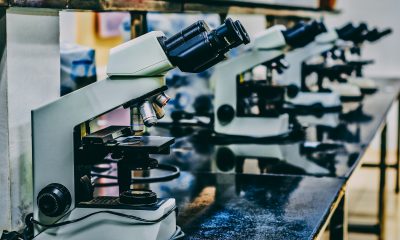Biotech
Asebio 2024: Driving Biotechnology as a Pillar of Spain and Europe’s Strategic Future
In 2024, Europe and Spain advanced strategic biotechnology legislation, reinforcing biotech as key to economic growth and autonomy. Spain’s biotech sector grew, generating €13B in revenue and over 131,000 jobs. Asebio’s report highlights biotech’s critical role in health, environment, and innovation, aligning with EU priorities to boost R&D, competitiveness, and industrial sovereignty.

Europe has established its independence by designating biotechnology as a strategic technology. In 2024, Europe introduced a significant legislative effort , including new strategies for life sciences, the bioeconomy, and startups. New regulations include the pharmaceutical legislative package, the Critical Medicines Act, regulations for new genomic techniques, the European Health Data Area, and the new Biotechnology Act. In Spain, Asebio highlghts alignment with EU goals.
In Spain, it was also a busy year for new strategic and legislative initiatives: the pharmaceutical industry strategy was published, and progress was made in drafting the royal decrees on health technology assessment and drug financing and pricing. Furthermore, we will also see the new law on medicines and medical devices and the law on industry and strategic autonomy. All of this regulation will have an impact on the biotechnology industry and will define the playing field for the sector for the next generation.
Spain’s biotech sector expands with strong legislative support, contributing to GDP, jobs, and innovation—Asebio highlights alignment with EU goals for health, sustainability, and industrial sovereignty
With this new regulatory environment, the Asebio 2024 report, presented last week, shows that biotechnology companies continued to grow, generating more than €13 billion in revenue, 1.1% of GDP. The biotechnology industry contributes €5.229 billion to the welfare state, 0.4% of GDP. Furthermore, they generate more than 131,000 jobs, 0.67% of total employment in our country.
In this regard, Ion Arocena, CEO of Asebio, commented in the report that these indicators not only reflect the tangible impact of biotechnology on the welfare economy and the creation of quality jobs, but also confirm that biotechnology is a key industry for Europe’s future, a fundamental pillar for ensuring its strategic autonomy, promoting people’s health, and protecting the environment.
“At Asebio, we are promoting our joint work with the CDTI (Spanish Institute of Technology and Innovation), with the goal of bringing European priorities to Spain and strengthening its role as a key player in promoting the biotechnology sector,” he said.
Arocena also explained that in 2024, the Draghi Report called for strengthening Europe’s competitiveness by boosting R&D, identified the pharmaceutical sector as one of the 10 key sectors for Europe, and set a general objective of maintaining and expanding the European Union’s capacity for R&D development, with special attention to biological products, orphan products, and advanced therapy medicines.
Asebio stated that they share the same vision as the Draghi report, which warned that public investment in R&D in the EU is lower and fragmented, compared to countries such as the United States and the growing presence of China , ensuring that we have a slow regulatory framework for medicines, coupled with the complex emergence of a European Health Data Area.
In July 2024, the European Commission included the commitment to enact the new European Biotechnology Law ( Biotech Act) in its 2024-2029 mandate program. This future regulation aims to increase the size and competitiveness of the EU biotechnology sector while maintaining high safety standards .
Rocío Arroyo, president of Asebio, explained in the report that “this is a unique opportunity for biotechnology to contribute structurally to the main challenges of the European project.”
For this reason, he argued that Spain is in a favorable position to make biotechnology one of the vectors of its leadership in innovation and industrial sovereignty. “To accelerate our growth, it is necessary to strengthen the mechanisms that connect scientific talent with industry, consolidate financial instruments tailored to the needs of our companies, and continue working on regulatory frameworks that keep pace with innovation. Asebio connects with the different stakeholders in the ecosystem and facilitates better understanding between academia, industry, and government. The convergence between European strategy and national capabilities represents a unique opportunity that we must seize.”
The Asebio Report is the leading publication for the biotechnology sector, prepared by the Spanish Association of Biocompanies
The report’s mission is to analyze all the areas that make up the current landscape of biotechnology development in our country and its evolution.
Therefore, the Asebio 2024 Report specifies that biotech companies grew by 4.1% and now represent more than 1,000 companies, specifically 1,014. Companies with secondary focus increased slightly by 1.1% to 311 companies, and companies using biotechnology as a production tool decreased to 2,887 companies.
Thus, human health remains the main area of activity for biotech companies , accounting for 58% of companies. This is followed by companies dedicated to food with 27%, agriculture and forestry with 17%, animal health and agriculture with 15%, the environment with 12%, and, in last place, industry with 10%.
In absolute terms, Catalonia, Madrid, and Andalusia continue to account for more than half of biotech companies and 83% of total revenue. During 2023, the largest growth in business demographics was recorded in Murcia, Navarre, Aragon, and the Canary Islands, with growth in the number of companies exceeding 15%.
By number of companies, Catalonia maintains its lead with the largest number of biotech companies , accounting for 24.56% of the total. It is followed by the Community of Madrid with 17.95%, Andalusia with 12.52%, the Basque Country with 9.57%, and the Valencian Community with 8.78%.
In terms of total turnover, Catalonia takes first place with 43.90%, followed by the Community of Madrid with 34.95%.
Asebio monitored the creation of new companies focused on biotechnology. Last year, 67 new biotech companies were identified. Of these companies, 19 were created in Catalonia, 12 in Andalusia, seven in the Basque Country, five in Madrid, five in Galicia , four in Asturias , four in Valencia , and three in Extremadura. Additionally, Castile and León and Murcia have two new companies, and one new company was identified each in Castile-La Mancha, Cantabria, and Navarre.
__
(Featured image by ALEXANDRE LALLEMAND via Unsplash)
DISCLAIMER: This article was written by a third party contributor and does not reflect the opinion of Born2Invest, its management, staff or its associates. Please review our disclaimer for more information.
This article may include forward-looking statements. These forward-looking statements generally are identified by the words “believe,” “project,” “estimate,” “become,” “plan,” “will,” and similar expressions. These forward-looking statements involve known and unknown risks as well as uncertainties, including those discussed in the following cautionary statements and elsewhere in this article and on this site. Although the Company may believe that its expectations are based on reasonable assumptions, the actual results that the Company may achieve may differ materially from any forward-looking statements, which reflect the opinions of the management of the Company only as of the date hereof. Additionally, please make sure to read these important disclosures.
First published in diariofarma. A third-party contributor translated and adapted the article from the original. In case of discrepancy, the original will prevail.
Although we made reasonable efforts to provide accurate translations, some parts may be incorrect. Born2Invest assumes no responsibility for errors, omissions or ambiguities in the translations provided on this website. Any person or entity relying on translated content does so at their own risk. Born2Invest is not responsible for losses caused by such reliance on the accuracy or reliability of translated information. If you wish to report an error or inaccuracy in the translation, we encourage you to contact us

-

 Crowdfunding4 days ago
Crowdfunding4 days agoReal Estate Crowdfunding in Mexico: High Returns, Heavy Regulation, and Tax Inequality
-

 Africa2 weeks ago
Africa2 weeks agoAgadir Allocates Budget Surplus to Urban Development and Municipal Projects
-

 Cannabis22 hours ago
Cannabis22 hours agoSouth Africa Proposes Liberal Cannabis Regulations with Expungement for Past Convictions
-

 Biotech1 week ago
Biotech1 week agoVolatile Outlook for Enlivex Therapeutics as Investors Await Clinical Catalysts
























